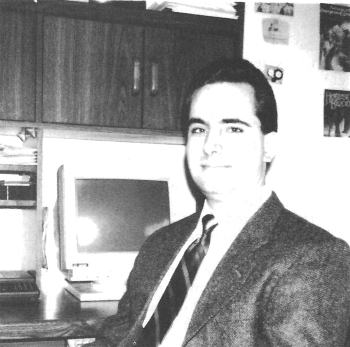Computer Prodigy Pioneers Cyberspace Revisionism
From the bedroom of his tidy, modest home in Portland, Oregon, a soft-spoken young computer prodigy named Dan Gannon has been stirring things up around the globe. Jewish-Zionist groups in the United States, and government officials in Europe, have been keeping a close watch on his controversial messages, which are accessed by computers around the world.
Since October 1988 he has devoted tremendous time and energy publishing revisionist materials and arguments on international computer networks. If anyone deserves to be called the pioneer of Holocaust revisionism on the worldwide computer networks, it is Gannon.
As many as two million persons around the world, Gannon estimates, have seen at least some of his postings.
If printed on paper, his posted messages, and the debate responses they've generated, would fill more than 6,000 pages.
Gannon has transcribed and made electronically available more than 150 revisionist articles and other items into the system, many of them from the IHR. “Sourced information, like the scholarly articles found in the IHR Journal, is by far the most useful” material, he says.
In 1993, Gannon was reaching hundreds of thousands over the Usenet “news groups” section of the Internet. Holocaust revisionism, he reported in late 1993, is one of the five best known and most popular Usenet topics, and was probably also one of the three most intensely debated.
Reflecting the highly emotional treatment of the Holocaust issue in motion pictures, television and other media, anti-revisionists typically respond to the postings by Gannon and other revisionists with hateful name-calling, vile invective, and sloppy, irrational arguments. “For a few years I was getting a lot of death threats – about 500 per year,” he says.
In August 1991 Gannon started his own computer bulletin board system (BBS), “Banished CPU.” Because several “provider” firms cut off his BBS from their networks, he has had to operate “Banished CPU” as a local BBS.
Gannon's activism has attracted media attention. Some television reports have been viciously slanted, deliberately misrepresenting what he actually says, and even giving the utterly false impression that he promotes criminal violence.
Relatively more objective was a February 1995 television report about Holocaust revisionism and other supposed Internet “Cyberhate” that was broadcast across Canada on “CBC Primetime Magazine.” It included portions of a film interview with Gannon conducted at his home in Portland by host Neil MacDonald.
Gannon's activism is not confined to the computer. He has arranged for the showing of the video “David Cole Interviews Dr. Franciszek Piper” in college classes at two Portland-area campuses. He also arranged for this video to be broadcast on local public access cable television. (It was shown on the most limited-area public access channel, on the pretext that it was “made in a foreign country,” a reference to a portion filmed at Auschwitz in Poland.)
Gannon has also distributed about a thousand revisionist leaflets in the Portland area, including Fred Leuchter's “Inside the Auschwitz 'Gas Chambers'” (published by the IHR), and an illustrated IHR advertisement for the Cole/Piper video.
Gannon's e-mail address is: […]
He can also be reached at [… address withheld for privacy reasons; ed.]
Bibliographic information about this document: The Journal of Historical Review, vol. 15, no. 4 (July/August 1995), pp. 28f.
Other contributors to this document: n/a
Editor’s comments: n/a

